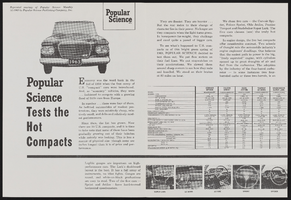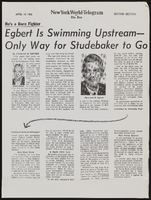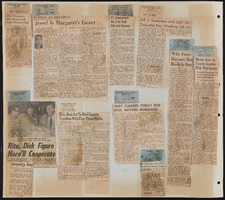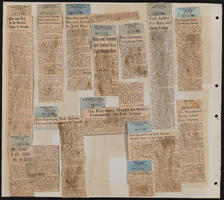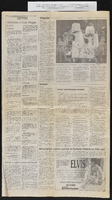Search the Special Collections and Archives Portal
Search Results
Joshua Abbey Papers
Identifier
Abstract
Collection is comprised primarily of files from approximately the early 1980s to 2017 detailing Joshua Abbey's theater and film career; his involvement with environmental efforts in Southern Nevada such as the Citizens Against Nuclear Waste in Nevada (CANWIN); and his involvement with the Jewish community in Las Vegas, including the Jewish Film Festival, the Jewish Federation, Temple Beth Sholom, and other organizations. The collection also includes information about the Jewish Community Center from the 1950s and a file on the film production of
Archival Collection
Brenda Pearson (Clark County Education Association) oral history interview conducted by Magdalena Martinez and Peter Grema: transcript
Date
Archival Collection
Description
From the Lincy Institute "Perspectives from the COVID-19 Pandemic" Oral History Project (MS-01178) -- Education sector interviews file.
Text
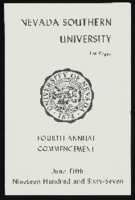
Nevada Southern University 4th commencement program
Date
Archival Collection
Description
Commencement program from University of Nevada, Las Vegas Commencement Programs and Graduation Lists (UA-00115).
Text
Mike O'Callaghan Professional Papers
Identifier
Abstract
The Mike O'Callaghan Professional Papers (1943, 1968-2004) mainly consist of research files gathered by Mike O'Callaghan in his post-political capacity as executive editor of the Las Vegas Sun as well as owner and publisher of the Henderson Home News, Boulder City News, and Green Valley News. The papers also contain handwritten and typewritten drafts of O'Callaghan's "Where I Stand" article for the Las Vegas Sun, along with his reporter's notebooks, monthly planners, and photographic prints. The research files cover a wide variety of topics, including but not limited to environmental issues; nuclear waste; state and local politics; military and veterans affairs; foreign relations including Israel, Iraq, and Korea; and education. The collection also contains copies of speeches given by O'Callaghan as the 23rd Governor of Nevada between 1971 and 1979, some of which contain handwritten notations.
Archival Collection

Tanya Olson oral history interview: transcript
Date
Archival Collection
Description
Oral history interview with Tanya Olson conducted by Claytee D. White on July 6, 2018 for the Remembering 1 October Oral History Project. In this interview, Olson recalls beginning October 2, 2017 to photograph scenes surrounding the aftermath of the shooting at the Route 91 Country Music Festival. Her efforts culminated in a film that highlights the Healing Garden, a memorial established after the shooting. It was dedicated on the first Friday of October 2017. Her 6-minute film, Forever In Our Hearts, is described as "Citizens unite to provide kindness and salve the wounds caused by the October 1, 2017 massacre during a Las Vegas country concert." The film was shown at the Nevada Women's Film Festival in 2018. Olson discusses beginning her latest endeavor, matriculating at the American Film Institute, a lifelong dream that she is pursuing after 23 years in the military, a film degree from University of Nevada, Las Vegas (UNLV), and completing her film project on one of the worst massacres in American history.
Text

